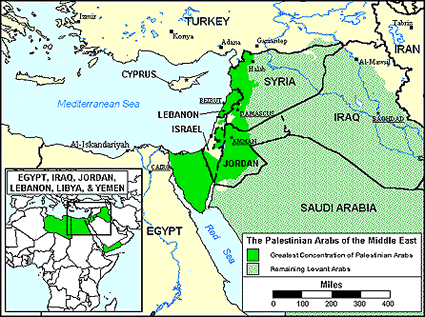When Roman emperor Hadrian conquered Israel in 135AD, he named the land Palestine. He chose this name because the Israelites had such a strong dislike for the Philistines (Palastina). Culturally many Palestinians claim they are Canaanites, the people who settled the land hundreds of years before. Biblically, Ham was a son of Noah and Canaan was a son of Ham. The word canani means "trader." Mizram, another son of Ham, was the name given for Egypt in Hebrew. The Bible states that Hagar, an Egyptian, became a bond servant to Sarah, the wife of Abraham. Unable to have children, Sarah gave Hagar to Abraham. Culturally this was acceptable at this time, however, it would not have been God's choice. Hagar gave birth to Ishmael. Genesis 16:12 says "His hand shall be against every man, and every man's hand against him." Ishmael had twelve sons who migrated into what are today the Arab nations. In Gen. 12:7-8 God said to Abraham that he would give him and his descendants the land (Israel) forever. In Deuteronomy 30:1-10, Gods promised to scatter Israel if they disobeyed him, but he would later restore them to their land. Because of their disobedience, the Israelites were taken into captivity to Assyria (approximately 734-732 BC.) and Babylon (587-585 BC). Israelis were scattered for centuries.
This changed when Israel became an official nation in 1948. Israel expanded their land holdings following the Six-Day War in 1967. The occupation of the Palestinian Territories of the West Bank and Gaza meant that many Palestinians fled and those who remained were not getting their needs met. Many lived in large refugee camps in neighboring Lebanon, Syria and Jordan. They face ongoing conflict with Israel; Lebanon and Jordan have taken in as many as they can. For this reason, many Palestinian Arabs want to settle in other parts of the world where they can earn a living and have their needs met. Some immigrated to the United States, Canada, Europe, and a small number went to Turkey. Most of them in Turkey are either in Istanbul or Ankara.
Palestinian Arabs usually feel welcome in Turkey. Turkey is a country that is sympathetic to the Palestinian situation. Many Palestinians have been in Turkey for 30 years or more. Others continue to come. There is a good chance more will arrive in Turkey throughout the 2020s.
Palestinians have adapted well to life in Turkey. Palestinian Arabs have done well in learning the Turkish language. Some are university students, while others open shops and restaurants. Many Palestinian businessmen, engineers and medical professionals are starting anew in Turkey. They can become citizens of Turkey by working there for five years, marrying a Turk or by buying property in Turkey.
Most Palestinians of Turkey are Sunni Muslim, and they worship alongside Turkish Muslims. Both groups are almost always Sunni Muslims who believe Mohammed's prophesies in the Koran and the power of Allah. They celebrate the same Islamic festivals as their Turkish hosts. All of them would love to go on a pilgrimage to Mecca, Saudi Arabia if they can afford it.
Some Palestinians in Turkey need job training.
Muslim Palestinians seldom find comfort in their religion. They desperately need to turn to the grace, guidance and love found in God's word. Only by allowing themselves to be spiritual healed through the eternal salvation of Jesus will the Palestinians of Turkey find relief from their emotional pain and have the peace found in accepting Jesus.
Pray that Palestinians in Turkey will be able to adapt to their new culture and find hope and peace through the grace, guidance and love found in God's word.
Pray that Turkey will be the place where Palestinian Muslims find their way to the cross and the empty grave.
Pray for Palestinian family leaders to have dreams of the risen and victorious Christ, giving them the will to follow the Lamb of God who takes away the sins of the world.
Scripture Prayers for the Arab, Palestinian in Türkiye (Turkey).
https://www.middleeastmonitor.com/20230830-trapped-in-a-legal-black-hole-palestinian-refugees-in-turkiye-dream-of-going-home/
https://www.imtilak.net/en/turkey/articles/palestinians-in-turkey
https://www.middleeastmonitor.com/20210916-turkey-is-now-the-destination-of-choice-for-palestinians/
| Profile Source: Joshua Project |













